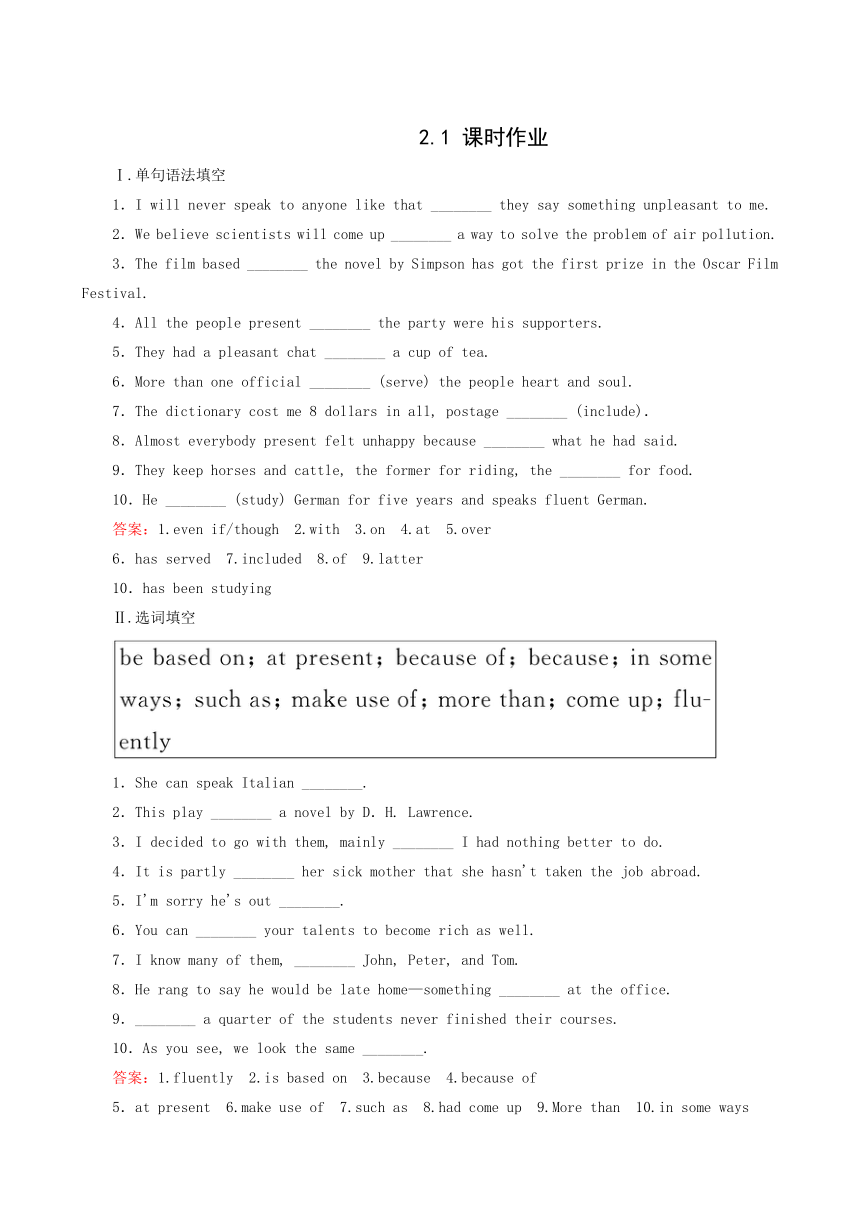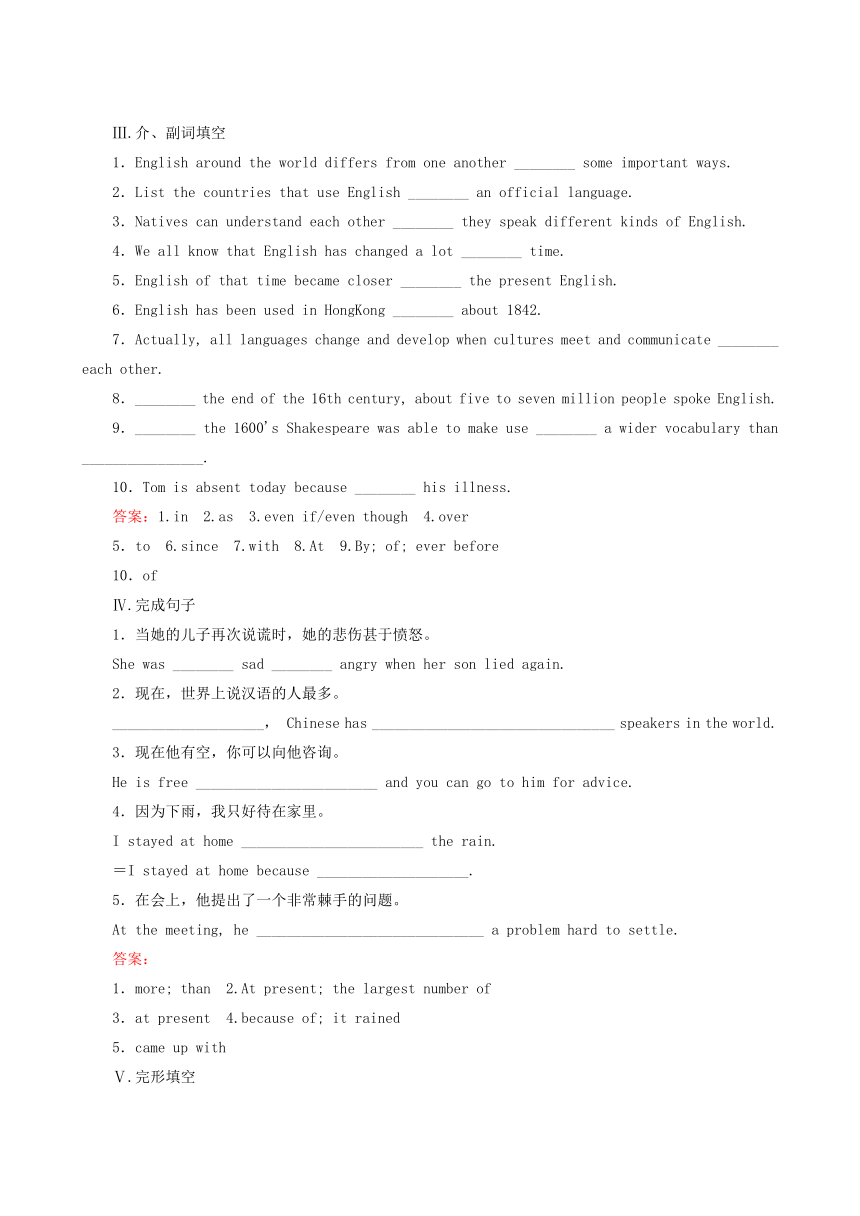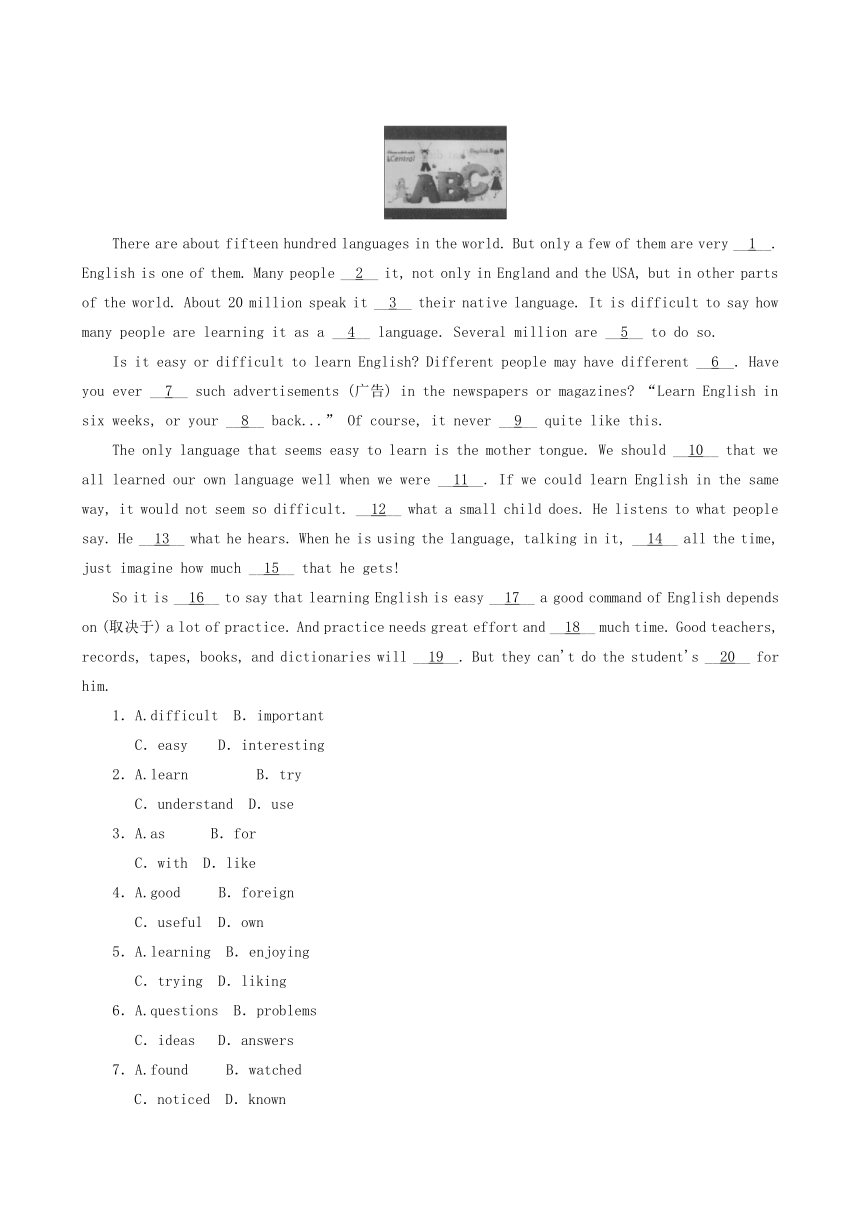人教版英语必修1同步练习:Unit 2 English around the world warming up & reading
文档属性
| 名称 | 人教版英语必修1同步练习:Unit 2 English around the world warming up & reading |

|
|
| 格式 | zip | ||
| 文件大小 | 387.4KB | ||
| 资源类型 | 教案 | ||
| 版本资源 | 人教版(新课程标准) | ||
| 科目 | 英语 | ||
| 更新时间 | 2016-12-28 22:45:10 | ||
图片预览



文档简介
2.1
课时作业
Ⅰ.单句语法填空
1.I
will
never
speak
to
anyone
like
that
________
they
say
something
unpleasant
to
me.
2.We
believe
scientists
will
come
up
________
a
way
to
solve
the
problem
of
air
pollution.
3.The
film
based
________
the
novel
by
Simpson
has
got
the
first
prize
in
the
Oscar
Film
Festival.
4.All
the
people
present
________
the
party
were
his
supporters.
5.They
had
a
pleasant
chat
________
a
cup
of
tea.
6.More
than
one
official
________
(serve)
the
people
heart
and
soul.
7.The
dictionary
cost
me
8
dollars
in
all,
postage
________
(include).
8.Almost
everybody
present
felt
unhappy
because
________
what
he
had
said.
9.They
keep
horses
and
cattle,
the
former
for
riding,
the
________
for
food.
10.He
________
(study)
German
for
five
years
and
speaks
fluent
German.
答案:1.even
if/though 2.with 3.on 4.at 5.over
6.has
served 7.included 8.of 9.latter
10.has
been
studying
Ⅱ.选词填空
1.She
can
speak
Italian
________.
2.This
play
________
a
novel
by
D.H.
Lawrence.
3.I
decided
to
go
with
them,
mainly
________
I
had
nothing
better
to
do.
4.It
is
partly
________
her
sick
mother
that
she
hasn't
taken
the
job
abroad.
5.I'm
sorry
he's
out
________.
6.You
can
________
your
talents
to
become
rich
as
well.
7.I
know
many
of
them,
________
John,
Peter,
and
Tom.
8.He
rang
to
say
he
would
be
late
home—something
________
at
the
office.
9.________
a
quarter
of
the
students
never
finished
their
courses.
10.As
you
see,
we
look
the
same
________.
答案:1.fluently 2.is
based
on 3.because 4.because
of
5.at
present 6.make
use
of 7.such
as 8.had
come
up 9.More
than 10.in
some
ways
Ⅲ.介、副词填空
1.English
around
the
world
differs
from
one
another
________
some
important
ways.
2.List
the
countries
that
use
English
________
an
official
language.
3.Natives
can
understand
each
other
________
they
speak
different
kinds
of
English.
4.We
all
know
that
English
has
changed
a
lot
________
time.
5.English
of
that
time
became
closer
________
the
present
English.
6.English
has
been
used
in
HongKong
________
about
1842.
7.Actually,
all
languages
change
and
develop
when
cultures
meet
and
communicate
________
each
other.
8.________
the
end
of
the
16th
century,
about
five
to
seven
million
people
spoke
English.
9.________
the
1600's
Shakespeare
was
able
to
make
use
________
a
wider
vocabulary
than
________________.
10.Tom
is
absent
today
because
________
his
illness.
答案:1.in 2.as 3.even
if/even
though 4.over
5.to 6.since 7.with 8.At 9.By;
of;
ever
before
10.of
Ⅳ.完成句子
1.当她的儿子再次说谎时,她的悲伤甚于愤怒。
She
was
________
sad
________
angry
when
her
son
lied
again.
2.现在,世界上说汉语的人最多。
____________________,
Chinese
has
________________________________
speakers
in
the
world.
3.现在他有空,你可以向他咨询。
He
is
free
________________________
and
you
can
go
to
him
for
advice.
4.因为下雨,我只好待在家里。
I
stayed
at
home
________________________
the
rain.
=I
stayed
at
home
because
____________________.
5.在会上,他提出了一个非常棘手的问题。
At
the
meeting,
he
______________________________
a
problem
hard
to
settle.
答案:
1.more;
than 2.At
present;
the
largest
number
of
3.at
present 4.because
of;
it
rained
5.came
up
with
Ⅴ.完形填空
There
are
about
fifteen
hundred
languages
in
the
world.
But
only
a
few
of
them
are
very
__1__.
English
is
one
of
them.
Many
people
__2__
it,
not
only
in
England
and
the
USA,
but
in
other
parts
of
the
world.
About
20
million
speak
it
__3__
their
native
language.
It
is
difficult
to
say
how
many
people
are
learning
it
as
a
__4__
language.
Several
million
are
__5__
to
do
so.
Is
it
easy
or
difficult
to
learn
English
Different
people
may
have
different
__6__.
Have
you
ever
__7__
such
advertisements
(广告)
in
the
newspapers
or
magazines
“Learn
English
in
six
weeks,
or
your
__8__
back...”
Of
course,
it
never
__9__
quite
like
this.
The
only
language
that
seems
easy
to
learn
is
the
mother
tongue.
We
should
__10__
that
we
all
learned
our
own
language
well
when
we
were
__11__.
If
we
could
learn
English
in
the
same
way,
it
would
not
seem
so
difficult.
__12__
what
a
small
child
does.
He
listens
to
what
people
say.
He
__13__
what
he
hears.
When
he
is
using
the
language,
talking
in
it,
__14__
all
the
time,
just
imagine
how
much
__15__
that
he
gets!
So
it
is
__16__
to
say
that
learning
English
is
easy
__17__
a
good
command
of
English
depends
on
(取决于)
a
lot
of
practice.
And
practice
needs
great
effort
and
__18__
much
time.
Good
teachers,
records,
tapes,
books,
and
dictionaries
will
__19__.
But
they
can't
do
the
student's
__20__
for
him.
1.A.difficult
B.important
C.easy
D.interesting
2.A.learn
B.try
C.understand
D.use
3.A.as
B.for
C.with
D.like
4.A.good
B.foreign
C.useful
D.own
5.A.learning
B.enjoying
C.trying
D.liking
6.A.questions
B.problems
C.ideas
D.answers
7.A.found
B.watched
C.noticed
D.known
8.A.knowledge
B.time
C.money
D.English
9.A.happened
B.looked
C.seemed
D.felt
10.A.know
B.remember
C.understand
D.think
11.A.students
B.children
C.babies
D.parents
12.A.Believe
B.Mind
C.Do
D.Think
13.A.uses
B.enjoys
C.tries
D.finishes
14.A.using
B.thinking
C.trying
D.practicing
15.A.time
B.money
C.language
D.practice
16.A.hard
B.easy
C.nice
D.clever
17.A.because
B.for
C.when
D.before
18.A.uses
B.takes
C.wastes
D.spends
19.A.do
B.work
C.help
D.learn
20.A.work
B.study
C.homework
D.listening
答案与解析:
1.解析:由下文可知:只有其中的几种语言是非常“重要的”。
答案:B
2.解析:根据文义,此处表达的是“很多人都在使用它”。
答案:D
3.解析:as为介词,意为“作为”。
答案:A
4.解析:与上一句的native相对。
答案:B
5.解析:一些人正努力去做(学英语)。try
to
do
sth.意为“努力去做某事”。
答案:C
6.解析:与前面的问句相呼应:不同的人有不同的回答。
答案:D
7.解析:你有没有注意到此类广告?
答案:C
8.解析:广告内容“六周之内学会英语,否则退款”。
答案:C
9.解析:指前面提到的承诺的事从来没有“发生”过。
答案:A
10.解析:用以提醒读者应该还“记得”……。
答案:B
11.解析:在我们还是“孩子时”我们就都已经学会了自己的母语。
答案:B
12.解析:“想一想”孩子是怎么做的吧。
答案:D
13.解析:孩子先听别人说,然后“尝试”他所听到的事情。
答案:C
14.解析:指使用母语,讲母语以及用母语“思考”。
答案:B
15.解析:上文所提到的using,
talking,
thinking都是为掌握一种语言所做的练习。
答案:D
16.解析:很难说英语很容易学,因为熟练掌握英语要取决于大量的练习。
答案:A
17.解析:表示直接原因时应使用because。
答案:A
18.解析:take在此表示“花费”之意。spend的主语应是人。
答案:B
19.解析:help在此表示“起作用,有帮助”。
答案:C
20.解析:但它们替代不了学生应做的事情。B、C、D三项只侧重了学生应做的事的某一个方面。
答案:A
Ⅵ.阅读理解
In
order
to
know
a
foreign
language
thoroughly(完全地),
four
things
are
necessary.
First,
we
must
understand
the
language
when
we
hear
it
spoken.
Secondly,
we
must
be
able
to
speak
it
ourselves,
correctly
with
confidence
and
without
hesitation
(犹豫).
Thirdly,
we
must
read
in
the
language
as
much
as
possible.
Besides,
we
must
be
able
to
write
it.
We
must
be
able
to
make
sentences
that
are
correct
in
grammar.
There
is
no
short
way
to
succeed
in
language
learning.
A
good
memory
(记忆)
is
a
great
help,
but
it
is
not
enough
only
to
memorize
the
rules
from
a
grammar
book.
It
is
no
much
use
learning
by
heart
long
lists
of
words
and
their
meanings,
studying
the
dictionary,
and
so
on.
We
must
learn
by
using
the
language.
If
we
are
pleased
with
a
few
rules
we
have
memorized,
we
are
not
really
learning
the
language.
We
must
“learn_through_use”.
Practice
is
important.
We
must
practise
speaking
and
writing
the
language
whenever
we
can.
1.The
most
important
things
to
learn
a
foreign
language
are
________.
A.understanding
and
speaking
B.hearing,
speaking,
reading
and
writing
C.writing
and
understanding
D.memorizing
and
listening
2.One
can
never
learn
a
foreign
language
well
only
by
________.
A.much
practice
B.referring
to
the
dictionary
C.learning
through
use
D.using
the
language
3.Which
of
the
following
is
the
most
important
in
learning
a
foreign
language
A.A
good
memory.
B.Speaking.
C.Practice.
D.Writing.
4.The
underlined
words
“learn
through
use”
in
the
last
paragraph
mean
________.
A.we
use
a
language
in
order
to
learn
it
B.we
learn
a
foreign
language
in
order
to
use
it
C.we
can
learn
a
language
well
while
we
are
using
it
D.both
B
and
C
答案与解析:
1.解析:学习一门外语最重要的是听、说、读、写四种技能,A、C、D三项都不够全面。
答案:B
2.解析:众所周知,学习语言只凭查词典是不好的。
答案:B
3.解析:在学习英语中,最重要的还是“练习”(practice)。古语说,熟能生巧(practice
makes
perfect)。
答案:C
4.解析:“在使用中学习”,强调学习的重要性。A项颠倒学与用的关系,B项不合题意。
答案:C
课时作业
Ⅰ.单句语法填空
1.I
will
never
speak
to
anyone
like
that
________
they
say
something
unpleasant
to
me.
2.We
believe
scientists
will
come
up
________
a
way
to
solve
the
problem
of
air
pollution.
3.The
film
based
________
the
novel
by
Simpson
has
got
the
first
prize
in
the
Oscar
Film
Festival.
4.All
the
people
present
________
the
party
were
his
supporters.
5.They
had
a
pleasant
chat
________
a
cup
of
tea.
6.More
than
one
official
________
(serve)
the
people
heart
and
soul.
7.The
dictionary
cost
me
8
dollars
in
all,
postage
________
(include).
8.Almost
everybody
present
felt
unhappy
because
________
what
he
had
said.
9.They
keep
horses
and
cattle,
the
former
for
riding,
the
________
for
food.
10.He
________
(study)
German
for
five
years
and
speaks
fluent
German.
答案:1.even
if/though 2.with 3.on 4.at 5.over
6.has
served 7.included 8.of 9.latter
10.has
been
studying
Ⅱ.选词填空
1.She
can
speak
Italian
________.
2.This
play
________
a
novel
by
D.H.
Lawrence.
3.I
decided
to
go
with
them,
mainly
________
I
had
nothing
better
to
do.
4.It
is
partly
________
her
sick
mother
that
she
hasn't
taken
the
job
abroad.
5.I'm
sorry
he's
out
________.
6.You
can
________
your
talents
to
become
rich
as
well.
7.I
know
many
of
them,
________
John,
Peter,
and
Tom.
8.He
rang
to
say
he
would
be
late
home—something
________
at
the
office.
9.________
a
quarter
of
the
students
never
finished
their
courses.
10.As
you
see,
we
look
the
same
________.
答案:1.fluently 2.is
based
on 3.because 4.because
of
5.at
present 6.make
use
of 7.such
as 8.had
come
up 9.More
than 10.in
some
ways
Ⅲ.介、副词填空
1.English
around
the
world
differs
from
one
another
________
some
important
ways.
2.List
the
countries
that
use
English
________
an
official
language.
3.Natives
can
understand
each
other
________
they
speak
different
kinds
of
English.
4.We
all
know
that
English
has
changed
a
lot
________
time.
5.English
of
that
time
became
closer
________
the
present
English.
6.English
has
been
used
in
HongKong
________
about
1842.
7.Actually,
all
languages
change
and
develop
when
cultures
meet
and
communicate
________
each
other.
8.________
the
end
of
the
16th
century,
about
five
to
seven
million
people
spoke
English.
9.________
the
1600's
Shakespeare
was
able
to
make
use
________
a
wider
vocabulary
than
________________.
10.Tom
is
absent
today
because
________
his
illness.
答案:1.in 2.as 3.even
if/even
though 4.over
5.to 6.since 7.with 8.At 9.By;
of;
ever
before
10.of
Ⅳ.完成句子
1.当她的儿子再次说谎时,她的悲伤甚于愤怒。
She
was
________
sad
________
angry
when
her
son
lied
again.
2.现在,世界上说汉语的人最多。
____________________,
Chinese
has
________________________________
speakers
in
the
world.
3.现在他有空,你可以向他咨询。
He
is
free
________________________
and
you
can
go
to
him
for
advice.
4.因为下雨,我只好待在家里。
I
stayed
at
home
________________________
the
rain.
=I
stayed
at
home
because
____________________.
5.在会上,他提出了一个非常棘手的问题。
At
the
meeting,
he
______________________________
a
problem
hard
to
settle.
答案:
1.more;
than 2.At
present;
the
largest
number
of
3.at
present 4.because
of;
it
rained
5.came
up
with
Ⅴ.完形填空
There
are
about
fifteen
hundred
languages
in
the
world.
But
only
a
few
of
them
are
very
__1__.
English
is
one
of
them.
Many
people
__2__
it,
not
only
in
England
and
the
USA,
but
in
other
parts
of
the
world.
About
20
million
speak
it
__3__
their
native
language.
It
is
difficult
to
say
how
many
people
are
learning
it
as
a
__4__
language.
Several
million
are
__5__
to
do
so.
Is
it
easy
or
difficult
to
learn
English
Different
people
may
have
different
__6__.
Have
you
ever
__7__
such
advertisements
(广告)
in
the
newspapers
or
magazines
“Learn
English
in
six
weeks,
or
your
__8__
back...”
Of
course,
it
never
__9__
quite
like
this.
The
only
language
that
seems
easy
to
learn
is
the
mother
tongue.
We
should
__10__
that
we
all
learned
our
own
language
well
when
we
were
__11__.
If
we
could
learn
English
in
the
same
way,
it
would
not
seem
so
difficult.
__12__
what
a
small
child
does.
He
listens
to
what
people
say.
He
__13__
what
he
hears.
When
he
is
using
the
language,
talking
in
it,
__14__
all
the
time,
just
imagine
how
much
__15__
that
he
gets!
So
it
is
__16__
to
say
that
learning
English
is
easy
__17__
a
good
command
of
English
depends
on
(取决于)
a
lot
of
practice.
And
practice
needs
great
effort
and
__18__
much
time.
Good
teachers,
records,
tapes,
books,
and
dictionaries
will
__19__.
But
they
can't
do
the
student's
__20__
for
him.
1.A.difficult
B.important
C.easy
D.interesting
2.A.learn
B.try
C.understand
D.use
3.A.as
B.for
C.with
D.like
4.A.good
B.foreign
C.useful
D.own
5.A.learning
B.enjoying
C.trying
D.liking
6.A.questions
B.problems
C.ideas
D.answers
7.A.found
B.watched
C.noticed
D.known
8.A.knowledge
B.time
C.money
D.English
9.A.happened
B.looked
C.seemed
D.felt
10.A.know
B.remember
C.understand
D.think
11.A.students
B.children
C.babies
D.parents
12.A.Believe
B.Mind
C.Do
D.Think
13.A.uses
B.enjoys
C.tries
D.finishes
14.A.using
B.thinking
C.trying
D.practicing
15.A.time
B.money
C.language
D.practice
16.A.hard
B.easy
C.nice
D.clever
17.A.because
B.for
C.when
D.before
18.A.uses
B.takes
C.wastes
D.spends
19.A.do
B.work
C.help
D.learn
20.A.work
B.study
C.homework
D.listening
答案与解析:
1.解析:由下文可知:只有其中的几种语言是非常“重要的”。
答案:B
2.解析:根据文义,此处表达的是“很多人都在使用它”。
答案:D
3.解析:as为介词,意为“作为”。
答案:A
4.解析:与上一句的native相对。
答案:B
5.解析:一些人正努力去做(学英语)。try
to
do
sth.意为“努力去做某事”。
答案:C
6.解析:与前面的问句相呼应:不同的人有不同的回答。
答案:D
7.解析:你有没有注意到此类广告?
答案:C
8.解析:广告内容“六周之内学会英语,否则退款”。
答案:C
9.解析:指前面提到的承诺的事从来没有“发生”过。
答案:A
10.解析:用以提醒读者应该还“记得”……。
答案:B
11.解析:在我们还是“孩子时”我们就都已经学会了自己的母语。
答案:B
12.解析:“想一想”孩子是怎么做的吧。
答案:D
13.解析:孩子先听别人说,然后“尝试”他所听到的事情。
答案:C
14.解析:指使用母语,讲母语以及用母语“思考”。
答案:B
15.解析:上文所提到的using,
talking,
thinking都是为掌握一种语言所做的练习。
答案:D
16.解析:很难说英语很容易学,因为熟练掌握英语要取决于大量的练习。
答案:A
17.解析:表示直接原因时应使用because。
答案:A
18.解析:take在此表示“花费”之意。spend的主语应是人。
答案:B
19.解析:help在此表示“起作用,有帮助”。
答案:C
20.解析:但它们替代不了学生应做的事情。B、C、D三项只侧重了学生应做的事的某一个方面。
答案:A
Ⅵ.阅读理解
In
order
to
know
a
foreign
language
thoroughly(完全地),
four
things
are
necessary.
First,
we
must
understand
the
language
when
we
hear
it
spoken.
Secondly,
we
must
be
able
to
speak
it
ourselves,
correctly
with
confidence
and
without
hesitation
(犹豫).
Thirdly,
we
must
read
in
the
language
as
much
as
possible.
Besides,
we
must
be
able
to
write
it.
We
must
be
able
to
make
sentences
that
are
correct
in
grammar.
There
is
no
short
way
to
succeed
in
language
learning.
A
good
memory
(记忆)
is
a
great
help,
but
it
is
not
enough
only
to
memorize
the
rules
from
a
grammar
book.
It
is
no
much
use
learning
by
heart
long
lists
of
words
and
their
meanings,
studying
the
dictionary,
and
so
on.
We
must
learn
by
using
the
language.
If
we
are
pleased
with
a
few
rules
we
have
memorized,
we
are
not
really
learning
the
language.
We
must
“learn_through_use”.
Practice
is
important.
We
must
practise
speaking
and
writing
the
language
whenever
we
can.
1.The
most
important
things
to
learn
a
foreign
language
are
________.
A.understanding
and
speaking
B.hearing,
speaking,
reading
and
writing
C.writing
and
understanding
D.memorizing
and
listening
2.One
can
never
learn
a
foreign
language
well
only
by
________.
A.much
practice
B.referring
to
the
dictionary
C.learning
through
use
D.using
the
language
3.Which
of
the
following
is
the
most
important
in
learning
a
foreign
language
A.A
good
memory.
B.Speaking.
C.Practice.
D.Writing.
4.The
underlined
words
“learn
through
use”
in
the
last
paragraph
mean
________.
A.we
use
a
language
in
order
to
learn
it
B.we
learn
a
foreign
language
in
order
to
use
it
C.we
can
learn
a
language
well
while
we
are
using
it
D.both
B
and
C
答案与解析:
1.解析:学习一门外语最重要的是听、说、读、写四种技能,A、C、D三项都不够全面。
答案:B
2.解析:众所周知,学习语言只凭查词典是不好的。
答案:B
3.解析:在学习英语中,最重要的还是“练习”(practice)。古语说,熟能生巧(practice
makes
perfect)。
答案:C
4.解析:“在使用中学习”,强调学习的重要性。A项颠倒学与用的关系,B项不合题意。
答案:C
